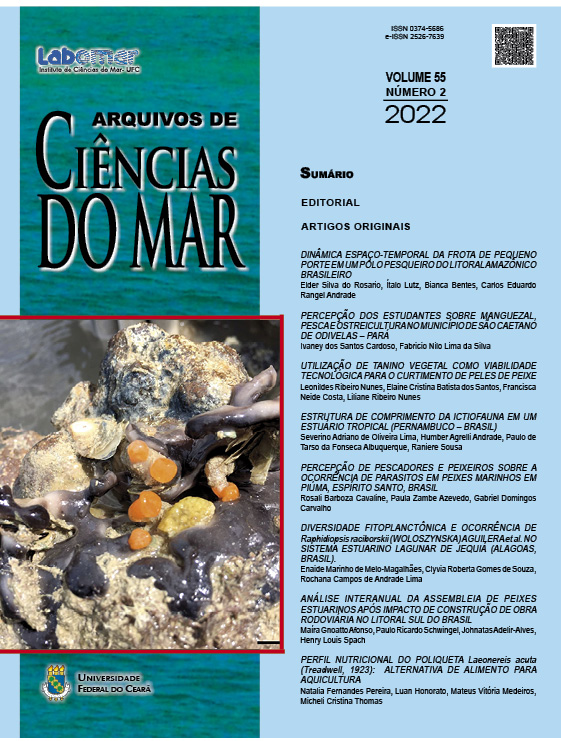Perception of fishermen and fishmongers about the occurrence of parasites in marine fishes in Piúma, Espírito Santo, Brazil
DOI:
https://doi.org/10.32360/acmar.v55i2.62635Abstract
The objective of this work was to carry out a survey with professionals who deal directly with fish (fishermen and fishmongers) about their perception of the occurrence of parasites in marine fish sold in Piúma, Espírito Santo, Brazil. Were interviewed 49 participants (30 fishermen and 19 fishmongers) of which 75% said that had already seen some type of parasite in fish, 21% reported having seen endoparasites, 33% ectoparasites and 46% both types. The most reported parasitism sites were gills, celomic cavity, skin, intestines, musculature, eyes, and head. The main fish species cited as hosts of parasites were: Micropogonias sp., Rhizoprionodon porosus, Balistes capriscus, Caranx lugubris and Coryphaena hippurus. The most frequently observed parasites were ectoparasites, which are easier to perceive, depending on their size and location of the host. The ectoparasites most observed by the interviewees were crustaceans belonging to the genera Eurydice, Nerocila and Rocinela. The interviewees had some empirical knowledge that enabled them to recognize that parasitism is something common and frequent in marine fish. However, about the zoonoses caused by parasites, they were unaware of this question, which is of concern from the point of view of public health.
Keywords: Eurydice, Nerocila, Rocinela, fishers, sea fish.
Downloads
Published
Issue
Section
License
1. Proposta de Política para Periódicos de Acesso Livre
Autores que publicam nesta revista concordam com os seguintes termos:
- Autores mantém os direitos autorais e concedem à revista o direito de primeira publicação, com o trabalho simultaneamente licenciado sob a Licença Creative Commons Attribution que permite o compartilhamento do trabalho com reconhecimento da autoria e publicação inicial nesta revista.
- Autores têm autorização para assumir contratos adicionais separadamente, para distribuição não-exclusiva da versão do trabalho publicada nesta revista (ex.: publicar em repositório institucional ou como capítulo de livro), com reconhecimento de autoria e publicação inicial nesta revista.
- Autores têm permissão e são estimulados a publicar e distribuir seu trabalho online (ex.: em repositórios institucionais ou na sua página pessoal) a qualquer ponto antes ou durante o processo editorial, já que isso pode gerar alterações produtivas, bem como aumentar o impacto e a citação do trabalho publicado (Veja O Efeito do Acesso Livre).

